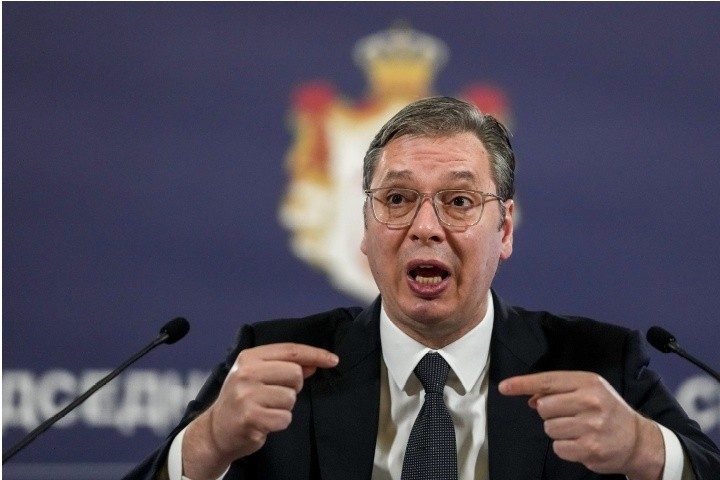
The international arrest warrant for Russian President Vladimir Putin will have negative consequences and only prolong the war in Ukraine, Serbian president Aleksandar Vučić said on March 19.
On March 17, the International Criminal Court (ICC) had issued the arrest warrant for Putin, accusing him of war crimes such as abducting children from Ukraine during the Russo-Ukraine conflict that began last February.
However, Vučić, who had previously touted his personal ties with Putin, slammed the court’s decision.
“I think issuing an arrest warrant for Putin, not to go into legal matters, will have bad political consequences and it says that there is a great reluctance to talk about peace [and] about truce” in Ukraine, Vučić said in an interview with reporters in Belgrade.
“My question is now that you have accused him of the biggest war crimes, who are you going to talk to now?” Vučić added.
“Do you really think that it is possible to defeat Russia in a month, three months or a year?” he asked, elaborating, “There is no doubt that the goal of those who did this is to make it difficult for Putin to communicate, so that everyone who talks to him is aware that he is accused of war crimes.”
When questioned if Putin would be arrested if he comes to Serbia, Vučić replied that such a question was “pointless,” “because it is clear that as long as the conflict continues, Putin has nowhere to go.”
Although Serbia is seeking European Union (EU) membership, it has retained close relations with Russia and is the only European state that has refrained from imposing international sanctions on Moscow.
Moreover, Vučić, a strong protestor of international war crimes courts, was a ranking official of a political party whose leader Vojislav Šešeljand and several other members faced trials in the international war crimes court for alleged crimes they perpetuated during the wars in the 1990s.
In the late 1990s, Vučić was the information minister in the government of then-Serbian President Slobodan Milošević during the war in Kosovo, where Serbian troops were blamed for various war crimes committed against Kosovo Albanian separatists.
Milošević was arrested in Serbia on war crimes charges in 2001. He died at the international war crimes court in the Hague in 2006 before his trial for the crimes committed by Serbian troops during the wars in the Balkans in the 1990s ended.
In a February 10 interview with the Serbian broadcaster PRVA TV, Vučić , cited by Russian state news agency TASS, raised eyebrows when he hinted that in the near future, the conflict in Ukraine would escalate, widen in scope, and ultimately go out of control.
Vučić predicted that should the Russo-Ukraine conflict intensify in the next five to six months, Serbia — owing to its landlocked position between Russia and Western nations — will probably be caught between a “hammer and an anvil.”
It “will be difficult for us, whoever wins,” Vučić admitted.
“We are facing the biggest crisis the world has seen since World War II,” the Serbian president posited. “What we have seen before is almost nothing compared to what is ahead of us. I know there’s a big escalation ahead of us, and I hope some people will realize we don’t need it. The next five or six months will be the worst of the conflict.”
Besides, the president also contended that considering Western nations’ decisions to provide Ukraine with tanks, they would soon decide to offer Ukraine F-16 jets as well.
Vučić also asserted that it is no longer certain as to who would ultimately emerge victorious in Ukraine, pointing out that initial reports raising questions of what would happen if Putin emerged as the winner have begun to circulate.
“What should we do? We must realize that we have investments from the West, and that we are on the European path. It is stupid when some say that we should [break ties with the West]. They would cry for higher salaries,” Vučić continued, adding that those who insisted that Serbia sever all ties with Russia were likewise foolish.
Notably, when asked what he would do if Serbia had to choose between the West and Russia, Vučić responded that he would know once the time arrived.
“I’ll know when it’s time and I won’t hide it from people,” he stated.
On March 18, Vučić and Kosovan Prime Minister Albin Kurti mutually assured each other that they would “normalize” ties after a 12-hour meeting at a vacation resort in Ohrid, North Macedonia.
Based on the negotiated deal as overseen by the EU’s foreign policy chief Josep Borrell, Serbia would not officially recognize Kosovo but would “take note” of its independence.
Effectively, Serbia will recognize Kosovo’s passports, license plates, as well as customs documents. Belgrade would also no longer veto Kosovo’s membership in international institutions.
In return, Kosovo would guarantee Serbia “an appropriate level of self-management” for the Serbian community in ethnic Albanian-majority Kosovo.
“To us, it is of great significance that the establishment of a Community of Serb Municipalities is stated as a priority commitment under previously signed agreements as part of the dialogue,” Vučić declared in a speech.
Kurti said that the agreement amounted to a “de facto” recognition by Serbia of Kosovo’s independence. However, observers noted that Kurti’s statement was premature as Vučić refused to formally sign the agreement.
“I do not want to sign any international legally binding documents with Kosovo because Serbia does not recognise its independence,” Vučić later disclosed.
Notwithstanding his stance, Vučić highlighted that Serbia “wants to have normal relations with Kosovo. We want to travel, we want to do business, you cannot live isolated behind 100 meter walls,” he said.
Furthermore, the EU would organize a donor conference for both countries and disseminate financial aid based on whether both countries took steps to mend ties.
Josep Borrell also mentioned that bilateral talks would carry on until both sides reach a comprehensive agreement. Borrell aded that the EU had originally hoped that both parties would have agreed to a “more ambitious and detailed” EU proposal.
In 2009, Serbia formally applied for EU membership. Before granting its request, Brussels indicated that Serbia first must normalize its relations with Kosovo. Although the latter declared its independence in 2008, Belgrade still considers Kosovo a Serbian province.



